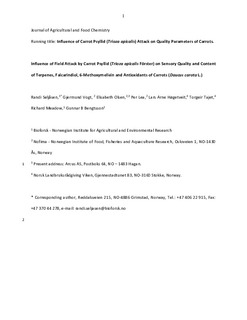Influence of Field Attack by Carrot Psyllid (Trioza apicalis Forster) on Sensory Quality, Antioxidant Capacity and Content of Terpenes, Falcarindiol and 6-Methoxymellein of Carrots (Daucus carota L.)
Seljåsen, Randi; Vogt, Kjell gjermund; Olsen, Elisabeth; Lea, Per; Høgetveit, Lars Arne; Taje, Torgeir; Meadow, Richard; Bengtsson, Gunnar
Journal article, Peer reviewed
Submitted version
Permanent lenke
http://hdl.handle.net/11250/2567655Utgivelsesdato
2013-02-17Metadata
Vis full innførselSamlinger
Originalversjon
Journal of Agricultural and Food Chemistry. 2013, 61 (11), 2831-2838. 10.1021/jf303979ySammendrag
The effect of different degrees of attack by carrot psyllid (Trioza apicalis) on quality parameters of carrots was studied in field experiments for two years. Treatments were different degrees of physical insect protection by floating row cover. An increasing attack level of psyllids showed an enhancement effect on the antioxidant capacity (ORAC), content of falcarindiol, 6-methoxymellein, and terpenes, and scores for bitter taste, chemical flavor, terpene flavor, and toughness. Carrot psyllid attack decreased the yield, total sugar, fructose, glucose, and sensory attributes sweet taste, color hue, color strength, crispiness, and juiciness. Carrot plants at 8−10 weeks of age tolerated attack by psyllids at low levels (2% leaves with curling or discoloration).
